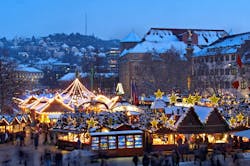EnBw, ABB Collaborate to keep Stuttgart’s Power Reliable
With a combination of upgraded power equipment, reusing still-useful gear in a clever way, and the power of collaboration, a German utility and its technology provider were able to boost safety and reliability for Stuttgart, the capital and largest city of the German state of Baden-Württemberg.
The two companies were able to upgrade more than 1,000 draws in 120 cubicles across five switchgear rooms in just 10 weeks. The project succeeded in modernizing how power is transmitted from EnBW’s Altbach /Deizisau energy plant in Stuttgart
EnBW, one of Germany’s largest suppliers of electricity, went to Swedish-Swiss multinational ABB to modernize and upgrade its legacy power grid infrastructure around the Altbach/Deizisau plant.
To deliver a project of such a comprehensive scope in a tight timeline, EnBW engaged the support of ABB to install and commission its latest low-voltage, digital switchgear solutions at the plant, which contributes to an electrical output of approximately 1,200MW. The two companies collaborated to deliver the needed upgrades in a timely fashion with no interruptions.
A Project With Scope
EnBw realized that it needed to do something about its aging low-voltage switchgear at the plant. The existing MNS2.0 system was from the earlier generation and the supply chain for spare parts was not reliable anymore. If the switchgear fell out of service, this could risk cutting off the power plant from the local grid. Altbach/Deizisau currently has an electrical output of 1,022 MW and can decouple up to 407 MW of district heating.
Instead of buying entirely new switchgear and replacing it outright, ABB’s concept was to replace the legacy MNS2.0 system with the MNS 3.0 in combination with ABB Universal Motor Controllers 100.3. With such a system, the owner-operators could use smart power components alongside the existing MNS switchgear to enable interconnectivity, smart automation and improved condition monitoring.
Maintaining Service
In bringing this system up to date, the grid operators could make sure there was a plentiful and reliable supply of power to the local grid even as they retained much of the switchgear that was still fully functional, boosting the plant’s the overall safety, sustainability and reliability.
Engineers with ABB’s Electrification Service found that about half of components like metal cabinets for switchgear, steel plates and busbars do not actually need replacing and can be used indefinitely so long as more sensitive pieces such as circuit breakers, relays and internal components are upgraded, regularly monitored and maintained, according to the ABB team.
A project of this size and scale required EnBW and its technology supplier to work together closely over the more than 12-month planning and implementation period. The effort involved bringing on board engineers from across Germany and beyond to come up with the most efficient project plan.
Making the Old New Again
Since project completion, EnBW’s critical infrastructure has benefited from greater safety and electricity reliability while keeping downtime minimized. Operational expenditure also dropped thanks to the reliability of the new equipment and cutting out the need to stop to make repairs and perform maintenance quite so often as with the previous, outmoded system.
The UMC 100.3 motor controller / MNS 3.0 system solved a set of problems for EnBW and Stuttgart energy consumers. Engineers found the combination of the two worked well in an existing installation even as it upgrades a legacy system that needed replacing. The project offered the opportunity as well to bring the facility into a common communications platform, thereby making the MNS switchgear future-proof.
The utility also plans to modernize the Altbach/Deizisau plant itself, swapping its fuel feedstock from hard coal to natural gas or some combination of hydrogen gas. EnBW pitched plans to local city councils to use natural gas for a time, followed by hydrogen for the long term. With the aid of green fuel, the CCGT plant in Altbach/Deizisau could also be climate-neutral by the mid-2030s, for instance, and still be used flexibly for energy generation.
About the Author
Axel Siebert
Axel Siebert is Project Manager from ABB’s Electrification Service in Germany.
Nhat Linh Hohn-Phung
Nhat Linh Hohn-Phung is a Project Manager for EnBW.

